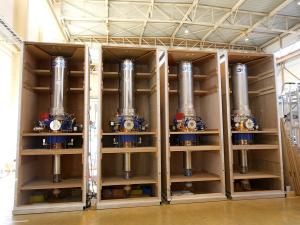Japan completes gyrotrons
To achieve extreme temperatures in the core of the plasma, ITER will rely on three external heating systems. One of them—electron cyclotron resonance heating—relies on the electromagnetic-wave-generating power of 24 slim, silver gyrotrons. Gyrotrons have been in development for decades as scientists worked to bring their performance to the levels required at ITER. Now, high-power, high-frequency gyrotrons are a reality.
Of the 24 required gyrotrons, Japan has been tasked by the ITER Organization with fabricating 8. The National Institutes for Quantum and Radioactive Science and Technology (QST) and Canon Electron Tubes & Devices Co., Ltd. (CETD) have completed the full manufacturing scope, and the four gyrotrons required for installation before First Plasma have passed all testing.
QST and CETD began the research and development of gyrotrons in 1993, and by 2008 they had developed the world's first gyrotron satisfying ITER's power requirements. After further adjustments to increase the durability of the gyrotrons, manufacturing began and the eight devices assigned to Japan were completed in May 2021.
Before the gyrotrons can be shipped to France, they must undergo rigorous performance tests. The gyrotron must withstand prolonged use under intense conditions and generate enough power to heat the plasma and maintain efficiency. Gyrotron testing at ITER requires electrical efficiency of more than 50% (50% of input electric energy converted to electromagnetic-wave power), and the success rate of repeated gyrotron operation must be at least 90%.
Now that four of Japan's gyrotrons have passed testing, plans are being made to transport them from their nests at QST to the ITER complex. The ultimate goal is to have all eight gyrotrons on site by 2024.
Once the gyrotrons arrive, they will be installed as part of the electron cyclotron resonance heating (ECRH) system, one of three methods (alongside neutral beam injection and ion cyclotron heating) ITER will use to heat plasma to its required temperature. ECRH works by heating electrons through intense beams of electromagnetic radiation, which can be directed to heat specific areas of plasma as needed.
The gyrotrons wait in their boxes now, cool and silent in their dormancy. But soon, as pieces of the ITER machine come together, they will hum with energy and ignite First Plasma.
Please see the original press release in Japanese.
Read more about the ITER gyrotrons here.


